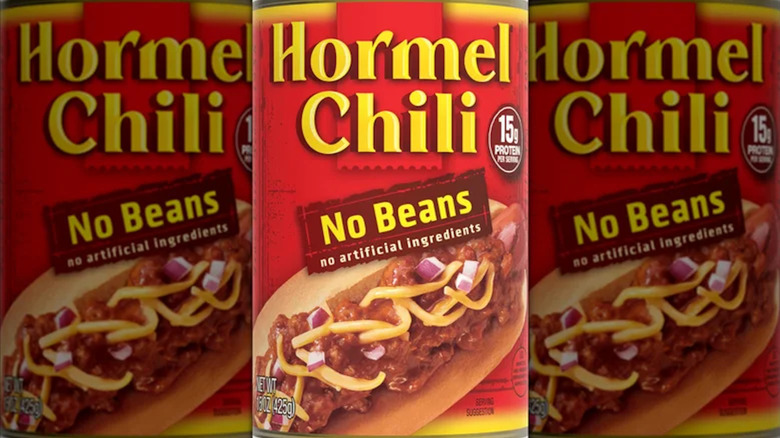We Didn't Expect A Popular Store-Bought Chili To Be One Of The Unhealthiest
Who doesn't love chili? This hearty dish is considered comfort food, yet comes with a wealth of nutrients. What's even better is you can buy it canned. So on those nights when you just can't cook, you can still whip up a healthy meal in minutes. But if healthy chili is what you're after, there's a popular store-bought brand we should warn you about.
Hormel might be a household name, but the brand's Chili No Beans isn't as healthy as it may appear. The label advertises no artificial ingredients, which is a big positive. But when you turn the can around to see the nutrition facts, you'll be less impressed. A one-cup serving of this chili contains a hefty amount of both saturated fat and sodium. More specifically, each portion contains 5 grams of saturated fat and 990 milligrams of sodium, which is 25% and 41% of the daily recommended values respectively. Making matters worse is the fact that the serving size is smaller than several other canned chili brands. To feel satiated, you're likely to eat more than one cup, increasing your total saturated fat and sodium intake.
There's a reason processed food companies write these numbers on labels. But despite hearing that these items are harmful in large quantities, you might not understand exactly why. To help you out, we'll detail the negative impact saturated fat and sodium can have on our health. Once these issues make sense, you may feel more inclined to avoid unhealthy store-bought canned chilis altogether.
Why health concerns regarding Hormel Chili matter
We're of the mindset that chili can be both healthy and delicious. But to find a brand that ticks both boxes, you have to pay attention to the details. This means reading the nutrition facts and ingredients, as well as exercising some critical thinking.
For starters, there's some controversy surrounding saturated fat. It's frequently been touted as unhealthy and labeled as the "bad" fat. However, saturated fat plays an important role in our bodies. The Journal of the American College of Cardiology reports that saturated fats contribute to hormone production and cardiovascular health. So where's the problem? The issue with saturated fats may lie more in the balance of fats we consume. A Journal of Nutrition study found that high saturated fat intake combined with low unsaturated fat intake was associated with higher rates of obesity. As such, it's important to understand the differences between saturated and unsaturated fats and aim for a healthier balance.
Meanwhile, sodium is an essential nutrient, meaning our body cannot produce it on its own; we must get it from our diet. Sodium is necessary to maintain proper hydration and to keep our muscles and nerves functioning well. But too much sodium can increase blood pressure and lead to cardiovascular issues. Certain canned foods are full of sodium, so look at those numbers before adding cans to your grocery cart. And remember, healthy eating is all about balance. So while sodium and saturated fat aren't inherently bad for you, too much can be harmful.

